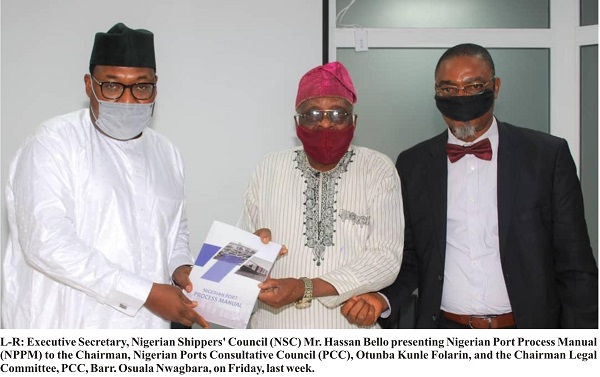Police Partner Terminals To Extort Nigerian Importers
· NPPM can end Police excesses, other corrupt vices – Freight agents
· Shippers’ Council has facilitated release of over 100 containers – Bello
By Kenneth Jukpor
Despite the port industry stakeholders’ efforts to enhance the ease of doing business in the sector, activities of Nigerian Police have become a major impediment to trade, causing delays in evacuating cargoes already cleared by Nigeria Customs Service (NCS) at the ports, and on the highways.
The Police, some seaport terminals and freight forwarding groups and individuals have been accused of complicity in the ploy to extort Nigerian importers.
While the Constitution of Nigeria confers on the Police the duty to maintain law and order, and keep the peace of the country, its move to ascertain the content of containers at port or the highways, have been described as a misnomer.
Seaport terminals have also been fingered in the practice as they enjoy more revenue from storage charges after receiving letters from the Maritime Division of Police not to release certain consignments already cleared by Customs.
MMS Plus investigations also reveal that some freight forwarding groups as well as influential individuals have pocketed millions by acting as informants to the Maritime Division of the Police.
The President of the National Association of Government Approved Freight Forwarders (NAGAFF), Chief Increase Uche lamented that freight forwarders are handicapped as the Police always claim to be “carrying out their responsibility which is all encompassing.”
He, however, argued that the problematic issue is that the activities of Police hinders free flow of trade.
“I’m not happy with this Police interception primarily because it is obstructing cargo flow, no matter the situation put forward by the Police. They should know where their interrogation or interference should stop, but they believe they have no limits,” he said.
The NAGAFF President also noted that the activities of the Police are fuelled by the prevailing policies, adding that if the government decides by a new policy that cargoes should not be obstructed in transit irrespective of the issue, the problem will be addressed.
Chief Uche expressed optimism that the recently launched Nigerian Ports Process Manual (NPPM) would help eliminate the excesses of the Police and other security agencies at ports, access roads and highways.
“NPPM can be the game-changer. That document was created by a wide array of port stakeholders under the guidance of Nigerian Shippers Council (NSC) which has also been appointed to lead and give direction on the implementation. I believe the implementation of that document will go a long way in addressing the interference of cargoes,” he said.
When quizzed on the proposed reasons the Maritime Police bosses have presented for such interferences, Uche said; “The Police keep saying the same thing. It is that they suspect such containers are carrying offensive items or goods that may constitute security threats. But the fact is that they’re abusing that privilege and something needs to be done because in all the countries we’re exporting to, we have realized that police interference does not pose a challenge like in Nigeria.”
Meanwhile, an ex-Governing Board Chairman of the Council for the Regulation of Freight Forwarding in Nigeria (CRFFN), Alhaji Hakeem Olanrewaju argued that the additional storage charges collected by terminal operators on consignments detained by Police after Customs clearance, should be waived.
The former CRFFN Boss argued that terminals inclination to collect additional charges by terminals could be an indication that they are part of the grand scheme to extort the Nigerian importing public, especially non-compliant ones.
Olanrewaju revealed that his cargoes have been intercepted unduly by Police on several occasions causing him additional storage charges at seaports as he had spent days negotiating the release of containers that had no offensive items.
In his words; “At the point of writing your Terminal Delivery Order (TDO), you could be told that the Marine Police who didn’t take part in the examination has written a letter that they suspect the cargo and it shouldn’t be released. That will take you another 3 to 4 days to solve and they will also extort from you, yet, nobody talks about this.”
“Out of all the affected containers Police have written letters to stop, how often do we hear or watch on television that the interception led to seizures. Over 90 percent of what they have stopped will be released immediately, if you do the needful settlements. They will give you a letter that they have released you, but this is a bad practice.”
“The terminal operators are also enjoying that because you’re paying extra. If you have written your TDO in 4 to 5 hours you can load and leave the port, but this arrangement creates an avenue to keep your cargoes waiting at terminals.”
He, however, encouraged freight agents and importers to stick to legitimate trade and comply with trade rules, arguing that non-compliance on the part of port users encourages the Police to carry on with the anomaly.
Efforts to reach the spokesman of Nigerian Police, Mr. Frank Mba proved abortive until presstime as he couldn’t take or reply his calls.
Meanwhile, on several occasions Nigerian Shippers’ Council has asked freight forwarders operating at the nation’s seaport to ignore unauthorized policemen that are involved in the illegal interception of already cleared cargoes.
Speaking with MMS Plus newspaper, the Executive Secretary of the NSC, Mr. Hassan Bello stated that the Council engaged the Inspector General of Police (IGP) Mohammed Adamu extensively on this menace, adding that the Council has facilitated the release of over 100 containers seized indiscriminately.
His words, “Shippers’ Council has released over 100 containers which were being treated by Police. We have discussed and worked things out with the Inspector-General of Police about eight months ago and signals were sent to all police units in Lagos that on no occasion should they interfere or detain containers already released by Customs.”
The NSC boss, however, noted that Police have powers to intervene when crimes are about to happen or suspected to take place.
Bello assured that the Council would continue to work with the Police to reduce the incidents of interception of containers
Recall that in a recent publication by MMS Plus on this subject, a police source revealed that some proceeds of this illicit interception are deployed to oil the machineries of the Police Force from the Area Command to the headquarters. It is, however, on record that no container has been tendered by the Marine police as carrying ‘dangerous’ cargoes despite the volume of containers intercepted every day as they levy each container a minimum fee of one hundred thousand naira, which they collect through their freight forwarder collaborators and accomplices.
Many industry observers have continued to ask why it is difficult for the successive police IGPs to stop their marine division from breaching the presidential Executive Order on the Ease of doing business in the port and reducing the cost of doing business in the port system if they do not get remittances from the funds as alleged.
Last week, incensed by the flagrant disregard for the Vice President’s Executive Order, the Managing Director of Nigerian Ports Authority (NPA), Ms. Hadiza Bala-Usman called on the presidency to sanction government agencies operating in the port in disobedience, thereby constituting human bottlenecks to efficient and cost-effective ports operation.
According to observers, there is no hope in NPPM salvaging the system if a presidential Executive Order can be flouted in such a bizarre manner by government agencies which are the enforcement arm of the federal government. “If an order was breached what can a mere manual achieve?” an observer asked.








